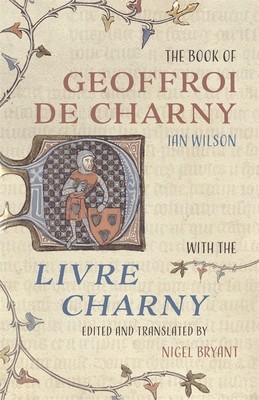
- We will send in 10–14 business days.
- Author: Ian Wilson
- Publisher: Boydell Press
- ISBN-10: 1783275855
- ISBN-13: 9781783275854
- Format: 15.2 x 23.6 x 1.5 cm, kieti viršeliai
- Language: English
- SAVE -10% with code: EXTRA
Reviews
Description
The Livre Charny (Charny's Book), by the 14th century French knight Geoffroi de Charny, translated here by Nigel Bryant with an introduction by Ian Wilson.
The poem known as the Livre Charny (Charny's Book), by the fourteenth-century French knight Geoffroi de Charny, has never been published, Nigel Bryant's brilliant new translation of this long-neglected poem, based on a hitherto overlooked original Charny manuscript housed in Oxford, vividly conveys Charny's self-deprecating and extraordinarily down-to-earth attitudes towards the knightly career. Charny is surprisingly blunt in his descriptions of the mishaps and mortal dangers to be expected, from losing in a tournament, to homesickness on crusade, to being concussed whilst attempting to scale an enemy tower. Nothing else quite like it is to be found in medieval literature. Ian Wilson's introduction provides a markedly revised understanding of Charny's career as tournament performer, serving soldier, crusader, councillor, and finally royal standard-bearer: he was killed at Poitiers in 1356. Bryant and Wilson also argue that Charny's Book is so different in style from the Book of Chivalry, also attributed to him, that the latter is unlikely to be by the same author. Using the evidence of a hitherto unnoticed manuscript in Madrid, they show that the latter is likely to be a work of the 1380s composed by Charny's son of the same name, possibly as a kind of memorial to his heroic father.EXTRA 10 % discount with code: EXTRA
The promotion ends in 23d.04:51:34
The discount code is valid when purchasing from 10 €. Discounts do not stack.
- Author: Ian Wilson
- Publisher: Boydell Press
- ISBN-10: 1783275855
- ISBN-13: 9781783275854
- Format: 15.2 x 23.6 x 1.5 cm, kieti viršeliai
- Language: English English
The Livre Charny (Charny's Book), by the 14th century French knight Geoffroi de Charny, translated here by Nigel Bryant with an introduction by Ian Wilson.
The poem known as the Livre Charny (Charny's Book), by the fourteenth-century French knight Geoffroi de Charny, has never been published, Nigel Bryant's brilliant new translation of this long-neglected poem, based on a hitherto overlooked original Charny manuscript housed in Oxford, vividly conveys Charny's self-deprecating and extraordinarily down-to-earth attitudes towards the knightly career. Charny is surprisingly blunt in his descriptions of the mishaps and mortal dangers to be expected, from losing in a tournament, to homesickness on crusade, to being concussed whilst attempting to scale an enemy tower. Nothing else quite like it is to be found in medieval literature. Ian Wilson's introduction provides a markedly revised understanding of Charny's career as tournament performer, serving soldier, crusader, councillor, and finally royal standard-bearer: he was killed at Poitiers in 1356. Bryant and Wilson also argue that Charny's Book is so different in style from the Book of Chivalry, also attributed to him, that the latter is unlikely to be by the same author. Using the evidence of a hitherto unnoticed manuscript in Madrid, they show that the latter is likely to be a work of the 1380s composed by Charny's son of the same name, possibly as a kind of memorial to his heroic father.

Reviews